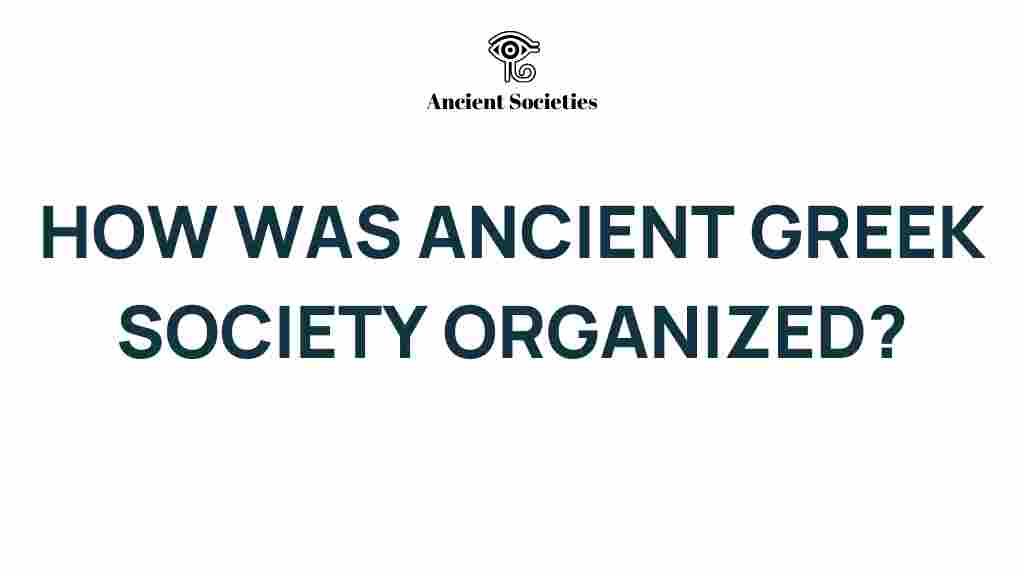Unraveling the Intricacies of Ancient Greece: Society, Organization, and Culture
Ancient Greece stands as a foundation of Western civilization, influencing various aspects of modern society, including politics, philosophy, and the arts. Understanding the organization and culture of Ancient Greece provides insight into its remarkable achievements and its lasting legacy. This article delves into the intricacies of Ancient Greek society, examining its city-states, democratic principles, philosophical advancements, and historical context.
1. The Structure of Ancient Greek Society
Ancient Greece was not a unified nation but a collection of independent city-states, known as *poleis*. Each city-state operated as a distinct political entity with its own government, laws, and customs. The most prominent city-states included Athens, Sparta, Corinth, and Thebes. Understanding the structure of these city-states is crucial to grasping the broader social organization.
- Athens: Known for its development of democracy and cultural achievements.
- Sparta: Renowned for its military-oriented society and strict societal roles.
- Corinth: A significant trade center known for its wealth and luxury.
- Thebes: Known for its military prowess and rivalry with Sparta and Athens.
2. The Organization of Society
The social hierarchy in Ancient Greece was complex, consisting of various classes and groups. The primary divisions included:
- Citizens: Male citizens had full political rights and were involved in governance.
- Metics: Foreign residents who were free but did not possess full citizenship rights.
- Slaves: Individuals who were considered property and had no rights.
Each city-state had its own specific rules regarding citizenship. In Athens, for example, only males born to Athenian parents could be citizens, while in Sparta, citizenship was granted to those who completed rigorous military training.
3. The Role of Democracy in Ancient Greece
Democracy, as we understand it today, finds its roots in Ancient Greece, particularly in Athens. Around the 5th century BCE, Athens developed a system of direct democracy that allowed citizens to participate in decision-making processes. This system was characterized by:
- Assembly (Ekklesia): All male citizens could attend and vote on important issues.
- Council (Boule): A group of 500 citizens chosen by lot to propose laws and manage daily affairs.
- Public Office: Many positions were filled through random selection, minimizing the influence of wealth and status.
This democratic framework allowed for a degree of public participation unheard of in most other societies of the time. However, it is essential to note that democracy was limited; women, slaves, and non-citizens were excluded from the political process.
4. Cultural Achievements of Ancient Greece
Culture flourished in Ancient Greece, with significant advancements in philosophy, art, and theater. These cultural elements not only reflected the values of society but also shaped the development of Western thought.
4.1 Philosophy
Ancient Greek philosophy laid the groundwork for many modern philosophical thoughts. Renowned philosophers such as Socrates, Plato, and Aristotle explored profound questions regarding ethics, existence, and knowledge. Their ideas continue to influence contemporary philosophy and science.
4.2 Art and Architecture
The art of Ancient Greece is celebrated for its beauty and realism. Key features include:
- Statues: Life-like representations of gods, athletes, and notable figures.
- Architecture: The use of columns and symmetry, exemplified in structures like the Parthenon.
- Theater: The development of tragedy and comedy, with playwrights like Sophocles and Aristophanes.
4.3 Religion
Religion played an integral role in the daily lives of the ancient Greeks. They worshipped a pantheon of gods and goddesses, such as Zeus, Athena, and Apollo. Religious festivals, such as the Olympic Games, were held in honor of the gods and were essential for community cohesion.
5. The Historical Context of Ancient Greece
The history of Ancient Greece is marked by significant events that shaped its society and culture. Key periods include:
- Mycenaean Period (1600-1100 BCE): Early Greek civilization characterized by powerful monarchies and trade.
- Dark Ages (1100-800 BCE): A period of decline following the fall of Mycenaean civilization.
- Archaic Period (800-500 BCE): The rise of city-states and the establishment of trade networks.
- Classical Period (500-323 BCE): The height of Greek culture, democracy, and military power.
- Hellenistic Period (323-30 BCE): The spread of Greek culture following the conquests of Alexander the Great.
Each period contributed to the development of society and culture, ultimately influencing subsequent civilizations.
6. Troubleshooting Common Misunderstandings About Ancient Greece
When studying Ancient Greece, several misconceptions may arise. Here are some common misunderstandings and clarifications:
- Misconception: Ancient Greece was a single entity.
- Clarification: It was a collection of independent city-states, each with its own government and customs.
- Misconception: Democracy in Ancient Greece was inclusive.
- Clarification: Only free male citizens could participate; women and slaves were excluded.
- Misconception: All Greeks shared the same culture and language.
- Clarification: While they shared many cultural elements, dialects and local customs varied significantly.
7. Conclusion: The Lasting Impact of Ancient Greek Society
In summation, Ancient Greece’s society, organization, and culture laid the groundwork for many aspects of the modern world. Its pioneering concepts of democracy, profound philosophical inquiries, and remarkable artistic achievements continue to resonate today. By unraveling the intricacies of Ancient Greek society, we gain a better understanding of the historical forces that have shaped our present.
For those interested in further exploring the rich history and culture of Ancient Greece, consider visiting this resource for a deeper dive into the subject.
Understanding Ancient Greece not only enriches our knowledge of history but also highlights the enduring legacy of its culture and philosophy in shaping contemporary society.
This article is in the category Society and created by AncientSocieties Team
